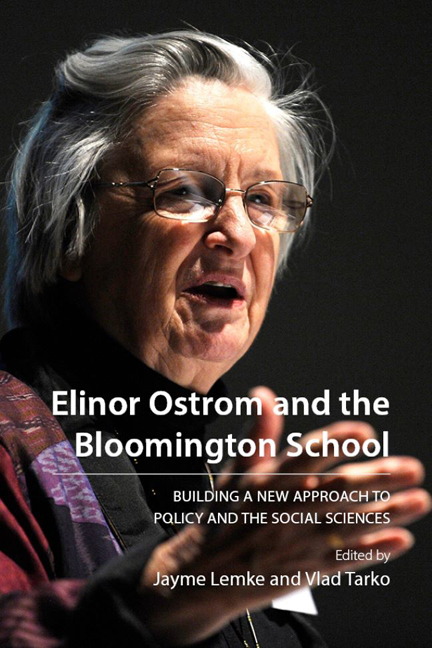Book contents
- Frontmatter
- Contents
- Acknowledgements
- Contributors
- 1 Introduction: the Bloomington school in context
- 2 Public choice theory: reuniting Virginia and Bloomington
- 3 New institutional economics: building from shared foundations
- 4 Elinor Ostrom as behavioral economist
- 5 New economic sociology and the Ostroms: a combined approach
- 6 Foundations of social order: the Ostroms and John Searle
- 7 Environmental policy from a self-governance perspective
- 8 Learning from the socialist calculation debate: is efficiency in public economics possible?
- 9 Public administration from “intellectual crisis” to contemporary “governance theory”
- 10 Rethinking federalism: social order through evolution or design?
- References
- Index
2 - Public choice theory: reuniting Virginia and Bloomington
Published online by Cambridge University Press: 21 December 2023
- Frontmatter
- Contents
- Acknowledgements
- Contributors
- 1 Introduction: the Bloomington school in context
- 2 Public choice theory: reuniting Virginia and Bloomington
- 3 New institutional economics: building from shared foundations
- 4 Elinor Ostrom as behavioral economist
- 5 New economic sociology and the Ostroms: a combined approach
- 6 Foundations of social order: the Ostroms and John Searle
- 7 Environmental policy from a self-governance perspective
- 8 Learning from the socialist calculation debate: is efficiency in public economics possible?
- 9 Public administration from “intellectual crisis” to contemporary “governance theory”
- 10 Rethinking federalism: social order through evolution or design?
- References
- Index
Summary
The economic theory of markets could be called “private choice” since it analyzes the way property rights generate incentives for individual action. Public choice, by contrast, uses that same theoretical framework to explain political behavior. There are distinct streams of thought within the broader field of public choice (Mitchell 1988). The Rochester school places a heavy emphasis on the use of mathematical and statistical techniques to formally model collective choice problems of elections and voting behavior. The Virginia school of public choice adopts an approach that foregrounds institutions, and treats politics not as primarily conflictual, but cooperative, with an emphasis on exchange. This contractarian and normative tradition is echoed in the Bloomington research agenda, but enriched through an interdisciplinary and empirical approach of its own.
This chapter explores the deep connections between the Virginia and Bloomington schools of political economy, focusing on three main figures: James Buchanan, Vincent Ostrom, and Elinor Ostrom. Buchanan and the Ostroms have led separate, but related, research programs with key areas of overlap and a distinct theoretical approach. Although diverging in important ways, they stem from shared core principles, developed by Buchanan and Tullock in The Calculus of Consent (1962), which later inspired the Ostroms’ approach to political economy.
The Ostroms’ work prepared the way for starting the Workshop in Political Theory and Policy Analysis at Indiana University Bloomington in 1973. The further studies developed through the workshop helped flesh out the Bloomington school's own distinct and rich framework of public choice. Although developed along distinct lines from the Virginia public choice tradition, the Ostroms recognized a debt of gratitude to Buchanan and Tullock's Calculus of Consent, and remarked that their own important works Governing the Commons, The Intellectual Crisis in American Public Administration and The Political Theory of a Compound Republic “resulted from the stimulus created by the organization of the Public Choice Society” (Aligica & Boettke 2009: 143). But, more generally, as Elinor Ostrom points out (E. Ostrom 2011b: 372), James Buchanan's influence permeated all of the Bloomington workshop's research program and was a driving influence in its development:
- Type
- Chapter
- Information
- Elinor Ostrom and the Bloomington SchoolBuilding a New Approach to Policy and the Social Sciences, pp. 7 - 24Publisher: Agenda PublishingPrint publication year: 2021



